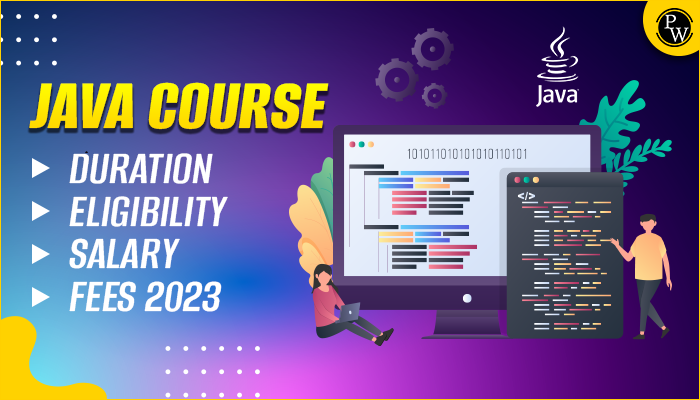Java is among the most common programming languages today! Learn about the applications of Java language in diverse domains such as finance, gaming, and more in this blog!
Application of Java Language: Let’s not be afraid to say it – Java is one of the world’s most common and popular programming languages. The latest data released in November 2022 by the TIOBE Programming Community ranked Java third in terms of popularity with 11.98%, just behind Python (17.18%) and C (15.08%).

Java finds many applications in almost all fields – web applications and services, big data, web development, data science, artificial intelligence, mobile app development, GUI apps, enterprise applications, and others.
In this blog, we’ll talk about applications of Java Language, Best uses, examples, and much more!
If you’re looking to start a career in Web Development, the PhysicsWallah’s Full Stack Web Development Course is just what you need! Our course is mentored by the top names in the industry that will teach you everything for success in your career! Use the coupon code “READER” and get an exclusive discount! Don’t wait! Enrol now!
Application of Java Programming Language
Here are some of the most common applications of Java Programming Language:
Mobile Applications
Java is recognized as the official programming language for creating mobile applications. It works well with tools like Android Studio and Kotlin. You might be curious about why Java is the preferred choice.
It operates on Java Virtual Machine (JVM), while Android utilises Dalvik Virtual Machine (DVK) for running class files. These files are then packaged as an Android application package (APK). Java and its Object-Oriented Programming (OOP) principles offer improved security and simplicity for Android.
Desktop GUI Applications
Java makes it simple to create desktop applications. It also lets you build graphical user interfaces (GUIs) using tools like Abstract Windowing Toolkit (AWT), Swing, and JavaFX.
AWT has ready-made components such as menus, lists, and buttons. Swing, on the other hand, is a toolkit for GUI widgets and includes more advanced elements like trees, scroll panes, tables, tabbed panels, and lists.
Web-based Applications
Java is employed for creating web applications as well. It offers extensive support for web applications using Servlets, Struts, or JSPs. Utilising these technologies, you can build various types of web applications as needed. The straightforward coding and strong security features of Java enable the development of numerous applications in areas like health, social security, education, and insurance.
Enterprise Applications
Many software developers prefer Java as their primary choice for writing applications, and Java Enterprise Edition (Java EE) stands out as a widely used platform. It offers an API and a runtime environment for scripting, covering network applications and web services.
Java EE is recognized as the foundation for numerous banking applications, where Java operates on the user interface (UI) and supports the server end.
Scientific Applications
Java is the preferred tool for software developers tackling scientific calculations and mathematical operations. These programs aim to be both highly secure and exceptionally fast. They boast enhanced portability and require low maintenance.
Java is utilised in influential applications such as MATLAB, where it serves both the user interface interaction and plays a role in the core system.
Application of Java Language in Real Life
Java has various applications in real life. However, here are some of the most common applications of Java language in real life:
Android Development
Java is widely used for making apps using controlled code that can operate on mobile gadgets. Programmers can use Java on the Android platform to write, control, manage, and oversee the Android device. The Java programming language and the Android SDK are employed to construct Android applications.
Hence, having a grasp of the basics of the Java programming language is necessary for Android platform programming. Java Micro Edition (JME) is a common cross-platform framework for crafting Android apps. The Java compiler compiles Java classes into bytecode, which the Dalvik Virtual Machine uses.
Server Apps in Finance
For more than two decades, financial institutions and banks have extensively utilised Java for software development. Java has transformed the approach to collecting and organising data, providing a reliable platform for developing web applications in the FinTech industry. This object-oriented programming language is crucial in the Big Data ecosystem.
Given the substantial volume of data handled by finance companies daily, Java proves adept at managing such vast amounts securely. Within the finance sector, businesses and organisations utilise Java to build systems for settlement and confirmation, digital solutions, trading platforms, data processing systems, and various other applications.
Embedded Systems
Although widely known for other uses, Java was originally intended for constructing embedded systems, which are a blend of several small systems collaborating to perform a specific function. Java, recognized for its efficiency and the ability to handle exceptions seamlessly, is well-suited for this purpose. The Internet of Things (IoT), involving numerous interconnected devices, holds the promise of transforming our world by introducing new uses and business opportunities.
Java has established itself as a viable solution for addressing the escalating complexity of software in this context. Presently, millions of programmers worldwide employ Java in embedded systems. Additionally, an important advantage of Java is its capability for code porting.
Also Read: Anagram In Java: Examples, Programs, Solutions
Applications of Java in Real World
Let’s look into the uses of Java in the real world:
Enterprise Solutions
Even though Java has been around for many years, its usage is continually changing. Java solutions are prevalent on nearly every platform, from desktops to smartphones. Java, being a programming language not tied to a specific platform, makes it easier to expand applications. It is a durable and adaptable language widely used for creating enterprise solutions.
This adaptability is a key factor in the realm of enterprise Java development. Businesses seeking scalable solutions often opt for Java in developing applications to handle their operational needs. Java proves beneficial for a variety of applications within enterprises, such as crafting mobile apps for Android users.
Given the demand for high performance in enterprise-grade applications, a robust technology stack is essential. Security is also crucial for enterprise applications due to the sensitive nature of data. This is where Java development services become invaluable. Major companies like Infosys, Google, HCL, and Wipro employ Java for developing enterprise applications.
Scientific Computing
One of the many several kinds of Java applications includes applications based on scientific computing. Being an object-oriented programming language Java has garnered some interest in the software community owing to its platform independence, robustness, syntactic simplicity, and comparative ease of programming.
Java is a mighty programming language for numerical and scientific computation, research, and more. It has a safe and highly portable environment to create applications that make use of scientific computing. With the benefit of strong mathematical calculations, Java can accomplish the exact results on various platforms. Mathematical Laboratory or MATLAB is one of the most favoured scientific applications that utilise Java for both frontend and backend development.
Trading Software
One of the rising applications of Java programming is Stock trading platforms. These platforms offer an uncomplicated way for stock traders to buy and sell commodities on several exchanges. Trading software requires to be extremely safe and scalable, as any lag could cause huge losses. It is assessed that more than 80 percent of electronic trading applications are written in Java.
The reason that this phenomenon has emerged is that the Java platform delivers the finest balance between execution, swiftness of application development, and ease of deployment and flexibility. Amongst the most noteworthy examples is the fact that almost all of the FIX engines are written in Java.
Best Uses of Java
Java fluency is undoubtedly a popular and in-demand skill. But what is the purpose of Java programming? We’ve previously touched on some Java use cases; we’ve elaborated on these and other Java examples further below.
Java can be used for many things:
Video games
When it comes to game development, programming languages such as C# and C++ are employed by game engines such as Unity and Unreal Engine. Java, on the other hand, is a great choice if you want to study graphics and game development from the ground up. There are numerous frameworks and libraries available, such as LibGDX and OpenGL.
Web-based programmes
Java is a well-known server-side programming language that is often used for constructing web applications. Spring, Struts, Hibernate, Apache Hadoop, and JSF are among the most popular Java frameworks for constructing Web applications. Java is also used by famous websites such as LinkedIn, AliExpress, Amazon, and many others.
Big data
Aside from Python, which is used in Big Data, there are many other popular programming languages. Even so, when it comes to Big Data Technology, most programmers prefer Java. The reason for this is that most famous Big Data tools, such as Hadoop and Deeplearning4j, use Java and its community support is excellent when it comes to Big Data Technology.
4 Types of Java Applications
- Standalone Applications
A program is run by a separate computer process without adding an existing file process is known as a standalone application. And also it does not require operating systems processes. AWT (Abstract Window Toolkit) and swing are used to create stand-alone applications.
- Web Applications
Web application is a client server software application which is run by the client. Web applications include mail, online retail sales, and Wikipedia. Servlet, jsp, jsf which are used to create web applications.
- Enterprise Application
Enterprise application is related to middleware applications. To enable software application and hardware systems we are using technologies and services across the enterprises. So we are calling it an enterprise application. Enterprise applications are mainly designed for corporate sides such as banking business systems.
- Mobile Application
Mobile applications are developed for running on mobile phones and tablets.
Also Read: API Full Form In Java
Java Applications Examples
Here are a few examples of Java applications:
Gaming Applications
Java has the support of the open-source most powerful 3D-Engine, the jMonkeyEngine which has unparalleled capability when it comes to the designing of 3D games. However, it does cause an occasional latency issue for games as garbage collection cycles can cause noticeable pauses. This issue will be solved in the newer versions of JVMs.
Big Data technologies
Java is the reason why the leading Big Data technologies like Hadoop have become a reality and also the most powerful programming languages like Scala are existing. It is crystal clear that Java is the backbone when it comes to developing Big Data using Java.
Business Applications
Java EE platform is designed to help developers create large-scale, multi-tiered, scalable, reliable, and secure network applications. These applications are designed to solve the problems encountered by large enterprises. The features that make enterprise applications powerful, like security and reliability, often make these applications complex.
The Java EE platform reduces the complexity of enterprise application development by providing a development model, API, and runtime environment that allow developers to concentrate on functionality.
Distributed Applications
Distributed applications have several common requirements that arise specifically because of their distributed nature and of the dynamic nature of the system and platforms they operate on. Java offers options to realise these applications.
The Jini (Java Intelligent Networking Infrastructure) represents an infrastructure to provide, register, and find distributed services based on its specification. One integral part of Jini is JavaSpaces, a mechanism that supports distribution, persistence, and migration of objects in a network.
Cloud-Based Applications
Cloud computing means on-demand delivery of IT resources via the internet with pay-as-you-go pricing. It provides a solution for IT infrastructure at a low cost. Java provides you with features that can help you build applications meaning that it can be used in the SaaS, IaaS and PaaS development. It can serve the companies to build their applications remotely or help companies share data with others, whatever the requirement.
Also Read: What is Java API? Definition, Types, & Uses
Java Applications for Beginners
Consider this list of Java programs that often help beginners learn how programming works:
- Hello World Program
The “Hello World Program” is typically one of the first programs users learn to write because it performs a simple task and often helps beginners learn Java’s basic syntax. Users may also employ this program as a sanity test to verify whether some software runs correctly.
- Basic calculator program
Another basic program for beginners is a calculator that performs the basic addition, subtraction, multiplication and division functions. This program may help beginners learn how to use the Scanner class and the switch case.
- Fibonacci series program
Creating a Fibonacci series program may help beginners continue to master their understanding of the Scanner class. A Fibonacci series is a group of numbers where every next number is the sum of the previous two numbers. This program also provides users with an example of Recursion and Dynamic Programming.
7 Benefits of Java
When Sun Microsystems released the Java Language Environment white paper in 1995, they listed the following seven benefits Java would bring to the world of software development:
- Java is simple and familiar.
- Java is object-oriented.
- Java is architecture-neutral.
- Java is robust and secure.
- Java is multithreaded.
- Java is capable of high performance.
- Java is statically typed and compiled.
Web Application in Java
Developing web applications in Java is a powerful and widely adopted practice. Java’s versatility, scalability, and platform independence make it an excellent choice for building robust and dynamic web solutions. Java-based web applications often leverage frameworks like Spring, JavaServer Faces (JSF), or Play Framework for efficient development.
These frameworks provide tools for handling various aspects, including MVC architecture, database connectivity, and security. Additionally, Java’s compatibility with servlets and JSP (JavaServer Pages) enables the creation of dynamic and interactive content. Whether it’s ecommerce platforms, content management systems, or enterprise-level applications, Java’s capabilities shine in delivering secure, high-performance web solutions.
Also Read: Applet In Java Program: Examples, Types
Which Application Is Using Java?
- Online gaming applications like Minecraft.
- Desktop applications like IntelliJ.
- Mobile operating systems like Android.
- Financial applications for companies like Citibank.
- Enterprise Java applications for database persistence.
- Microservices for Docker-based deployments.
Why is Java an Application Software?
Java is not an application software itself; rather, it is a programming language that allows developers to create application software. Java provides a platform-independent and object-oriented framework for building a wide range of applications, from small desktop tools to large-scale enterprise systems.
Java is a flexible programming language. it has applicability in all industries and for all Practical uses. Java is the platform for businesses seeking scalable and powerful enterprise applications and solutions. you have arrived at the proper location if you wish to learn web application development for any computing platform.
For Latest Tech Related Information, Join Our Official Free Telegram Group : PW Skills Telegram Group
Application of Java Language FAQs
What are the primary applications of Java?
Java is widely used for developing web applications, mobile apps on Android, enterprise-level software, and desktop applications, showcasing its versatility across diverse domains.
Why is Java popular for web development?
Java's popularity in web development stems from its robust frameworks like Spring and JavaServer Faces (JSF), ensuring scalable, secure, and platform-independent solutions.
How does Java contribute to mobile app development?
Java is a key language for Android app development, offering a flexible and powerful platform. Android applications are typically written in Java or Kotlin, enhancing their compatibility and performance.
In what scenarios is Java preferred for enterprise applications?
Java is favoured for large-scale enterprise applications due to its Enterprise JavaBeans (EJB), Spring, and Java EE, providing features like transaction management, security, and scalability.
What makes Java suitable for cross-platform development?
Java's "Write Once, Run Anywhere" principle, facilitated by the Java Virtual Machine (JVM), ensures that Java code can be executed on various platforms, enhancing its cross-platform compatibility.



